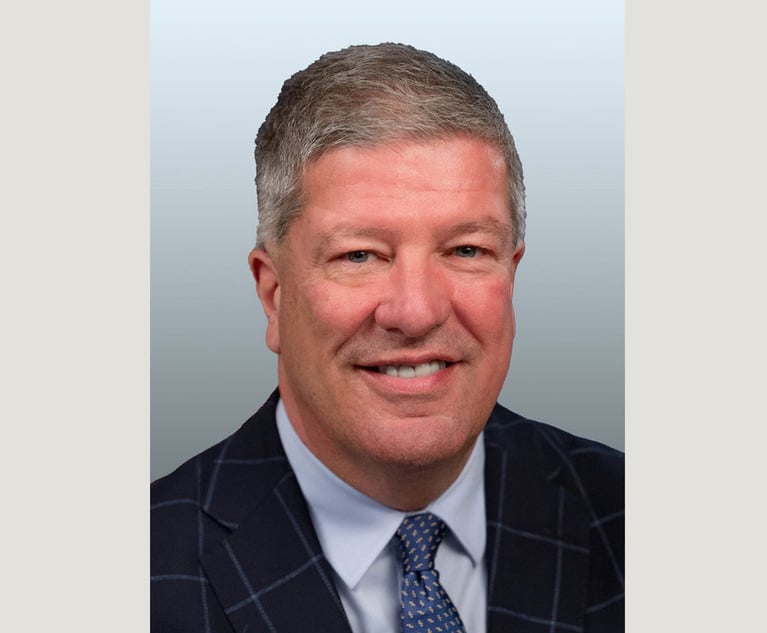Attorney Assails Special Distinction Barring State Liability for Guardrails
Appellate courts in Pennsylvania have distorted case law dealing with sovereign immunity and improperly created an arbitrary distinction for highway guardrails, an attorney argued before the state Supreme Court.
October 18, 2017 at 09:08 AM
8 minute read
 Appellate courts in Pennsylvania have distorted case law dealing with sovereign immunity and improperly created an arbitrary distinction for highway guardrails, an attorney argued before the state Supreme Court.
Appellate courts in Pennsylvania have distorted case law dealing with sovereign immunity and improperly created an arbitrary distinction for highway guardrails, an attorney argued before the state Supreme Court.
Pittsburgh attorney Mark Homyak, who is representing members of a family allegedly injured by a hazardous “spearing” guardrail, argued that his clients' case clearly met the real property exception to the sovereign immunity statute; however, he said a wrongfully decided 2000 state Supreme Court ruling has been improperly relied on by the Commonwealth Court to arbitrarily distinguish highway guardrails from all other real property owned by the state.
“The highway versus all real property distinction doesn't exist,” Homyak said.
Arguments in Homyak's case, Cagey v. PennDOT, focused on whether the Supreme Court should overrule its 2000 decision in Dean v. Department of Transportation.
The Dean court ruled that the failure to install a guardrail did not constitute a dangerous condition that would fall under the real property exception because it did not “render the highway unsafe for the purposes for which it was intended, i.e. travel on the roadway.” In several subsequent rulings, beginning with Fagan v. Department of Transportation in 2008, the Commonwealth Court held that Dean also meant the state was immune from claims alleging guardrails were negligently designed or maintained.
Although Homyak said he thought Dean was wrongly decided, he stopped short of asking the justices to fully overrule Dean, and said the court could rule in his client's favor without overturning the case.
Homyak said Dean's central holding—that the absence of a guardrail did not create a dangerous condition of the real property—was proper in the case, but said subsequent language saying the missing guardrail did not render it unsafe for its intended purpose was vague and has been misunderstood. That language, which Homyak described as ”non-decisional,” could be clarified by the court, he said.
“That's not a holding from which we can give guidance in the future,” Homyak said. “The exceptions are not ambiguous. They are unambiguously broad, and yet this court has interested it narrowly,”
Justice David Wecht said he agreed that “sometimes the error in a precedent only manifests over time,” but asked Homyak whether finding in his favor would create a “perverse incentive” for the state not to erect any guardrails in an effort to avoid liability.
Homyak contended that the state would still have a common-law duty to ensure the safe travel.
Arguing for the Pennsylvania Department of Transportation, attorney John Knorr of the Pennsylvania Attorney General's Office contended that the Supreme Court had already clarified the issue when it applied Dean to a case very similar to the one the Cagey's case made. That ruling, however, was done in a per curiam order.
Calling it a “cryptic case,” Justice Max Baer said by issuing the per curiam order, the Supreme Court may have simply chosen not to wade into that case, which, he noted, was more complicated than Dean, as alcohol was also involved.
Justice Christine Donohue also said the per curiam decision might weigh in favor of overruling Dean completely. She likened the situation to the state putting up unsafe handrails on steep steps outside a state-owned building—a situation she said clearly seemed to fall within the real property exception.
“Isn't that a somewhat artificial distinction we're being asked to make here?” she said.
Knorr said the distinction may be arbitrary, but it is one the legislature agreed to in the sovereign immunity statute, which he noted has not been changed despite the Dean holding. He added that a dangerous condition must be tied to the purpose of the property, and so the defect could only arise out of things like potholes and dangerous gradients of the pavement.
Max Mitchell can be contacted at 215-557-2354 or [email protected]. Follow him on Twitter @MMitchellTLI.
 Appellate courts in Pennsylvania have distorted case law dealing with sovereign immunity and improperly created an arbitrary distinction for highway guardrails, an attorney argued before the state Supreme Court.
Appellate courts in Pennsylvania have distorted case law dealing with sovereign immunity and improperly created an arbitrary distinction for highway guardrails, an attorney argued before the state Supreme Court.
Pittsburgh attorney Mark Homyak, who is representing members of a family allegedly injured by a hazardous “spearing” guardrail, argued that his clients' case clearly met the real property exception to the sovereign immunity statute; however, he said a wrongfully decided 2000 state Supreme Court ruling has been improperly relied on by the Commonwealth Court to arbitrarily distinguish highway guardrails from all other real property owned by the state.
“The highway versus all real property distinction doesn't exist,” Homyak said.
Arguments in Homyak's case, Cagey v. PennDOT, focused on whether the Supreme Court should overrule its 2000 decision in Dean v. Department of Transportation.
The Dean court ruled that the failure to install a guardrail did not constitute a dangerous condition that would fall under the real property exception because it did not “render the highway unsafe for the purposes for which it was intended, i.e. travel on the roadway.” In several subsequent rulings, beginning with Fagan v. Department of Transportation in 2008, the Commonwealth Court held that Dean also meant the state was immune from claims alleging guardrails were negligently designed or maintained.
Although Homyak said he thought Dean was wrongly decided, he stopped short of asking the justices to fully overrule Dean, and said the court could rule in his client's favor without overturning the case.
Homyak said Dean's central holding—that the absence of a guardrail did not create a dangerous condition of the real property—was proper in the case, but said subsequent language saying the missing guardrail did not render it unsafe for its intended purpose was vague and has been misunderstood. That language, which Homyak described as ”non-decisional,” could be clarified by the court, he said.
“That's not a holding from which we can give guidance in the future,” Homyak said. “The exceptions are not ambiguous. They are unambiguously broad, and yet this court has interested it narrowly,”
Justice David Wecht said he agreed that “sometimes the error in a precedent only manifests over time,” but asked Homyak whether finding in his favor would create a “perverse incentive” for the state not to erect any guardrails in an effort to avoid liability.
Homyak contended that the state would still have a common-law duty to ensure the safe travel.
Arguing for the Pennsylvania Department of Transportation, attorney John Knorr of the Pennsylvania Attorney General's Office contended that the Supreme Court had already clarified the issue when it applied Dean to a case very similar to the one the Cagey's case made. That ruling, however, was done in a per curiam order.
Calling it a “cryptic case,” Justice
Justice Christine Donohue also said the per curiam decision might weigh in favor of overruling Dean completely. She likened the situation to the state putting up unsafe handrails on steep steps outside a state-owned building—a situation she said clearly seemed to fall within the real property exception.
“Isn't that a somewhat artificial distinction we're being asked to make here?” she said.
Knorr said the distinction may be arbitrary, but it is one the legislature agreed to in the sovereign immunity statute, which he noted has not been changed despite the Dean holding. He added that a dangerous condition must be tied to the purpose of the property, and so the defect could only arise out of things like potholes and dangerous gradients of the pavement.
Max Mitchell can be contacted at 215-557-2354 or [email protected]. Follow him on Twitter @MMitchellTLI.
This content has been archived. It is available through our partners, LexisNexis® and Bloomberg Law.
To view this content, please continue to their sites.
Not a Lexis Subscriber?
Subscribe Now
Not a Bloomberg Law Subscriber?
Subscribe Now
NOT FOR REPRINT
© 2025 ALM Global, LLC, All Rights Reserved. Request academic re-use from www.copyright.com. All other uses, submit a request to [email protected]. For more information visit Asset & Logo Licensing.
You Might Like
View All
Over 700 Residents Near 2023 Derailment Sue Norfolk for More Damages
3 minute read
Stevens & Lee Hires Ex-Middle District of Pennsylvania U.S. Attorney as White-Collar Co-Chair
3 minute read
Trump RTO Mandates Won’t Disrupt Big Law Policies—But Client Expectations Might
6 minute read
Trending Stories
- 1Ex-Prosecutor’s Trial Ends as Judge Throws Out Her Felony Indictment in Ahmaud Arbery Death Case
- 2Conversation Catalyst: Transforming Professional Advancement Through Strategic Dialogue
- 3Trump Taps McKinsey CLO Pierre Gentin for Commerce Department GC
- 4Critical Mass With Law.com's Amanda Bronstad: 700+ Residents Near Ohio Derailment File New Suit, Is the FAA to Blame For Last Month's Air Disasters?
- 5Law Journal Column on Marital Residence Sales in Pending Divorces Puts 'Misplaced' Reliance on Two Cases
Who Got The Work
J. Brugh Lower of Gibbons has entered an appearance for industrial equipment supplier Devco Corporation in a pending trademark infringement lawsuit. The suit, accusing the defendant of selling knock-off Graco products, was filed Dec. 18 in New Jersey District Court by Rivkin Radler on behalf of Graco Inc. and Graco Minnesota. The case, assigned to U.S. District Judge Zahid N. Quraishi, is 3:24-cv-11294, Graco Inc. et al v. Devco Corporation.
Who Got The Work
Rebecca Maller-Stein and Kent A. Yalowitz of Arnold & Porter Kaye Scholer have entered their appearances for Hanaco Venture Capital and its executives, Lior Prosor and David Frankel, in a pending securities lawsuit. The action, filed on Dec. 24 in New York Southern District Court by Zell, Aron & Co. on behalf of Goldeneye Advisors, accuses the defendants of negligently and fraudulently managing the plaintiff's $1 million investment. The case, assigned to U.S. District Judge Vernon S. Broderick, is 1:24-cv-09918, Goldeneye Advisors, LLC v. Hanaco Venture Capital, Ltd. et al.
Who Got The Work
Attorneys from A&O Shearman has stepped in as defense counsel for Toronto-Dominion Bank and other defendants in a pending securities class action. The suit, filed Dec. 11 in New York Southern District Court by Bleichmar Fonti & Auld, accuses the defendants of concealing the bank's 'pervasive' deficiencies in regards to its compliance with the Bank Secrecy Act and the quality of its anti-money laundering controls. The case, assigned to U.S. District Judge Arun Subramanian, is 1:24-cv-09445, Gonzalez v. The Toronto-Dominion Bank et al.
Who Got The Work
Crown Castle International, a Pennsylvania company providing shared communications infrastructure, has turned to Luke D. Wolf of Gordon Rees Scully Mansukhani to fend off a pending breach-of-contract lawsuit. The court action, filed Nov. 25 in Michigan Eastern District Court by Hooper Hathaway PC on behalf of The Town Residences LLC, accuses Crown Castle of failing to transfer approximately $30,000 in utility payments from T-Mobile in breach of a roof-top lease and assignment agreement. The case, assigned to U.S. District Judge Susan K. Declercq, is 2:24-cv-13131, The Town Residences LLC v. T-Mobile US, Inc. et al.
Who Got The Work
Wilfred P. Coronato and Daniel M. Schwartz of McCarter & English have stepped in as defense counsel to Electrolux Home Products Inc. in a pending product liability lawsuit. The court action, filed Nov. 26 in New York Eastern District Court by Poulos Lopiccolo PC and Nagel Rice LLP on behalf of David Stern, alleges that the defendant's refrigerators’ drawers and shelving repeatedly break and fall apart within months after purchase. The case, assigned to U.S. District Judge Joan M. Azrack, is 2:24-cv-08204, Stern v. Electrolux Home Products, Inc.
Featured Firms
Law Offices of Gary Martin Hays & Associates, P.C.
(470) 294-1674
Law Offices of Mark E. Salomone
(857) 444-6468
Smith & Hassler
(713) 739-1250





